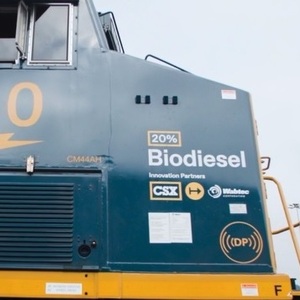CSX tests B20 in Florida locomotive fleet

July 21, 2023
BY CSX
CSX’s culture of collaboration and commitment to sustainability are coming together in a project aimed at certifying alternative fuel use in locomotives.
Testing of 20 percent soybean oil-based fuel in a locomotive fleet serving a Tampa, Florida, phosphate customer began in 2022 to demonstrate the effectiveness of the B20 biodiesel blend in Wabtec FDL Advantage engines, and the project continues to yield impressive results.
The 10 locomotives in the test have burned more than 200,000 gallons of B20 fuel, which reduces greenhouse gas emissions by nearly 20 percent. The goals of the project are to provide verified emissions-reduction data, monitor the impacts of burning B20 on locomotive engine components, and gain approval from the U.S. Environmental Protection Agency (EPA) for long-term use of higher biodiesel fuel blends in locomotives.
Advertisement
“It’s a win long term for us, but it’s also a win for our shippers,” said Arthur Adams, senior vice president of sales and marketing. “I’m excited about the broader impact this will have in enabling our customers to accelerate some of the commitments they’ve made to their customers to reduce their environmental footprint.”
The project is a prime example of collaboration, involving CSX, the locomotive manufacturer and the customer. Based in Pittsburgh, Pennsylvania, Wabtec has modernized the 10 AC4400 locomotives with FDL Advantage engine technology and will periodically perform necessary EPA emissions testing on these units at its Erie, Pennsylvania, facility. In addition, the CSX Mechanical Department has been collecting B20 fuel samples to verify its composition.
Advertisement
The phosphate customer, Mosaic, has also been a key partner in the project. As a company with a strong environmental commitment of its own, Mosaic agreed to allow the testing to take place on the fleet that operates in dedicated service to its mining, manufacturing and distribution operations in the Tampa area. Operating the locomotives in closed-loop service has provided a controlled test environment.
CSX expects to complete the test this year and submit data to the EPA in 2024.
Related Stories
The U.S. Energy Information Administration maintained its forecast for 2025 and 2026 biodiesel, renewable diesel and sustainable aviation fuel (SAF) production in its latest Short-Term Energy Outlook, released July 8.
XCF Global Inc. on July 10 shared its strategic plan to invest close to $1 billion in developing a network of SAF production facilities, expanding its U.S. footprint, and advancing its international growth strategy.
U.S. fuel ethanol capacity fell slightly in April, while biodiesel and renewable diesel capacity held steady, according to data released by the U.S. EIA on June 30. Feedstock consumption was down when compared to the previous month.
XCF Global Inc. on July 8 provided a production update on its flagship New Rise Reno facility, underscoring that the plant has successfully produced SAF, renewable diesel, and renewable naphtha during its initial ramp-up.
The USDA’s Risk Management Agency is implementing multiple changes to the Camelina pilot insurance program for the 2026 and succeeding crop years. The changes will expand coverage options and provide greater flexibility for producers.
Upcoming Events










